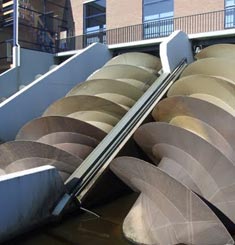Archimedes
Who is Archimedes?

Archimedes (c. 287 BC - 212 BC) was an ancient Greek mathematician, physicist, engineer, astronomer and philosopher born in the seaport colony of Syracuse, Sicily. He is considered by some historians of mathematics to be one of the greatest mathematicians from ancient times. He discovered the relation between the surface and volume of a sphere and its circumscribing cyclinder (he discovered pi). He then formulated a hydrostatic principle based on that mathmatical relationship called Archimedes' principle.
Archimedes was an aristocrat, the son of an astronomer, but little is known of his early life except that he studied for a time in Alexandria, Egypt. Several of his books were preserved by the Greeks and Arabs into the Middle Ages. In many areas of mathematics as well as in hydrostatics and statics, his work and results were not surpassed for over 1500 years.
His claim to fame

Although his main claim to fame is as a mathematician, Archimedes is also known for his many discoveries and inventions in physics and engineering, which include the following.
He invented the water-screw, which is still used in Egypt, for irrigation, draining marshy land and pumping out water from the bilges of ships.
He invented various devices used to defend Syracuse when it was besieged by the Romans. These included powerful catapults, the burning-mirror and systems of pulleys. It was his pride in what he could lift with the aid of pulleys and levers which provoked his glorious phrase "Give me a place to stand and I will move the earth".
He discovered the hydrostatic principle that a body immersed in a fluid is subject to an upthrust equal to the weight of fluid displaced by the body. This discovery is said to have inspired his famous cry "Eureka".